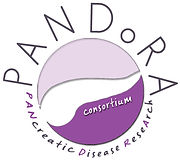CURRENT/PLANNED PROJECTS
The following projects have been approved by the consortium and are being carried out, or will be started in the near future:
Title: Multifactorial risk score
PI(s): Daniele Campa, Federico Canzian
Institution(s): Dept. of Biology, University of Pisa, and Genomic Epidemiology Group, DKFZ.
Description: We will generate a multifactorial score for prediction of risk of pancreatic cancer within PANDoRA, using data on established epidemiological risk factors (smoking, alcohol, obesity, diabetes, chronic pancreatitis, family history of pancreatic cancer) and known genetic risk factors emerging from GWAS. We will evaluate the performance of the risk score by use of Receiver Operating Characteristic curves.
Title: PANDoRA GWAS and GWAS meta-analysis
PI(s): Federico Canzian
Institution(s): Genomic Epidemiology Group, DKFZ.
Description: About 3000 pancreatic cancer cases and 5000 controls available in PANDoRA will be genotyped with the Illumina Global Survey Array, a SNP genotyping array including about 600,000 SNPs, in close collaboration with NCI. Genotyping will be performed at NCI. Data of the PANDoRA GWAS will be meta-analyzed with those of previously published and new GWAS. This will allow to identify new loci associated with pancreatic cancer risk and survival.
Title: Genetic risk factors for IPMN
PI(s): Oliver Strobel, Federico Canzian
Institution(s): University Hospital Heidelberg, and Genomic Epidemiology Group, DKFZ.
Description: Intraductal papillary mucinous neoplasms (IPMN) of the pancreas are known precursor lesions of pancreatic ductal adenocarcinoma (PDAC). We aim to assess the genetic risk for IPMN in the PANDoRA consortium. As a first step we aim to collect DNA and clinical data of a large number of patients with IPMN. In this collection we will verify whether known genetic risk factors for PDAC that have emerged from GWAS are also associated with IPMN susceptibility or with the risk of malignancy in IPMN. We will perform a GWAS on about 350 IPMN cases and 1000 controls from Germany and if sufficient additional IPMN cases can be collected in PANDoRA, they will be used for validation of findings.
Title: Secondary analyses using PanScan data
PI(s): Daniele Campa, Federico Canzian
Institution(s): Dept. of Biology, University of Pisa, and Genomic Epidemiology Group, DKFZ.
Description: GWAS must use a very stringent significance threshold because many statistical tests are performed. However, this strategy is prone to the risk of having many false negatives. Reducing the number of tests will relax the required significance threshold, thereby increasing statistical power to detect associations with pancreatic cancer for each SNP. One strategy for reducing the number of tests is to only test SNPs with heightened prior probabilities of association. These hypothesis will be tested: 1) consider only early onset (age of diagnosis <55) pancreatic cancer cases and controls; 2) investigate SNPs predicted to affect micro RNA binding (miR-SNPs); 3) investigate inflammatory and immune-related SNPs present in the Illumina ImmunoChip; 4) evaluate the role of mitochondrial SNPs (mtSNPs) and nuclear SNPs involved in mitochondrial function. After a first round of reanalysis of PanScan GWAS data, we will use all the PANDoRA cases and controls to replicate the most promising candidates.
Title: Genetic variability of the genes involved in the response to gemcitabine treatment to predict clinical outcomes in PDAC patients
PI(s): Valerio Pazienza
Institution(s): IRCSS Casa Sollievo della Sofferenza, San Giovanni Rotondo
Description: Variations of the key genes involved in the nucleoside analogue pathway may be responsible for chemotherapy failure and may help to identify patients with different mortality risk and/or subgroups with different progression risk. We will investigate whether variants of key driver genes in the nucleoside analogue pathway affect mortality and/or different disease progression as well as prognosis of PDAC patients.
Last updated on 16 August 2017
